Uber misses its ride
Why multi-billion dollar transportation network companies like Uber and Lyft should be regulated under the same laws and held to the same standards as local taxi companies.
On April 7, the Hawaii House Finance Committee (FIN) voted to pass Senate Bill 1280 (SD2, HD2), or the transportation network company (TNC) regulation bill, out of committee unamended, despite the efforts of local TNC companies to convince legislators to kill it. The bill passed by a resounding vote of 14 Ayes to 0 No votes, with only Rep. Gene Ward excused, and will now need to go before the full state House for a third reading vote.
SB1280 “Requires the public utilities commission to regulate transportation network companies and transportation network company drivers,” and “Establishes insurance requirements and qualifications for persons who operate or serve as drivers for transportation network companies.”
Put simply, it requires TNCs like Uber Hawaii and Lyft to play by the same rules as local taxi companies like The Cab, Charlie’s Taxi and EcoCab.
On April 2, Uber Hawaii, which has led the charge against the bill, held a rally and press conference at the state capitol; more than 50 Uber drivers marched around the capitol holding signs with slogans like, “Don’t Kill My Job,” “SB1280: Fix It, Or Nix It,” “I ♥ Uber” and “I’m An Entrepreneur.” The marchers delivered a petition with 7,000 signatures to the FIN committee as well.
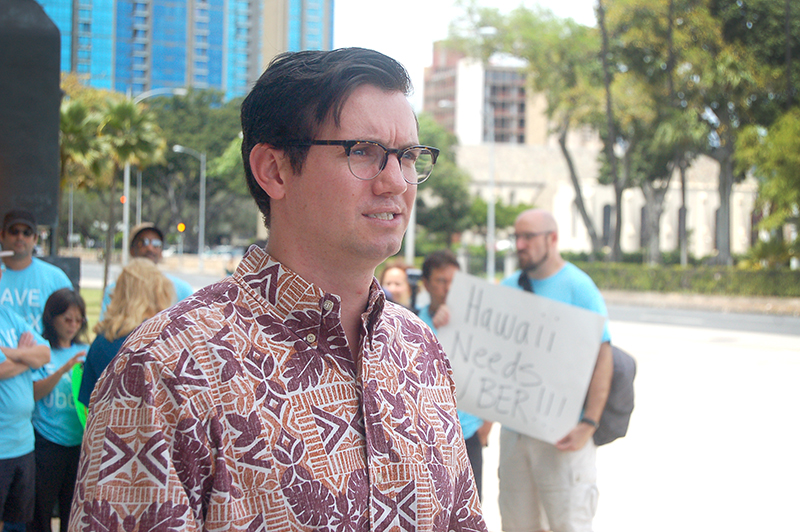
Brian Hughes (pictured above), the general manager for Uber Hawaii, told the gathered media that Hawaii needs Uber, and that SB1280 would kill ride-sharing in Hawaii. “We welcome reasonable ride-sharing regulations and actually supported the first draft of this bill, but the current draft is not 21st century legislation,” said Hughes. “Just as it’s important to have companies and customer service that is forward-thinking, it’s important to have legislation that is forward-thinking.
“Thankfully most markets are moving forward and adopting sensible ride-sharing regulations, but there are a few that have refused,” continued Hughes. “The legislation currently before the House Finance Committee would effectively end ride-sharing in Hawaii.”
This is the same basic message that Uber has been pushing in the online media realm. In the weeks leading up to the FIN vote, Uber sent out a personalized email to anyone who signed up for their app and provided contact information:
Hey Will,
As you know, in less than a year since launching, ridesharing services like uberX are helping to connect thousands of residents and visitors to safe, reliable ride [sic] all over Oahu and Maui and providing income opportunities to hundreds of Hawaii residents.
Unfortunately, Uber is under threat of being shut down in Hawaii. Next week, your Senator will be voting on the fate of Uber in Hawaii.
Will you help us save Uber Hawaii?
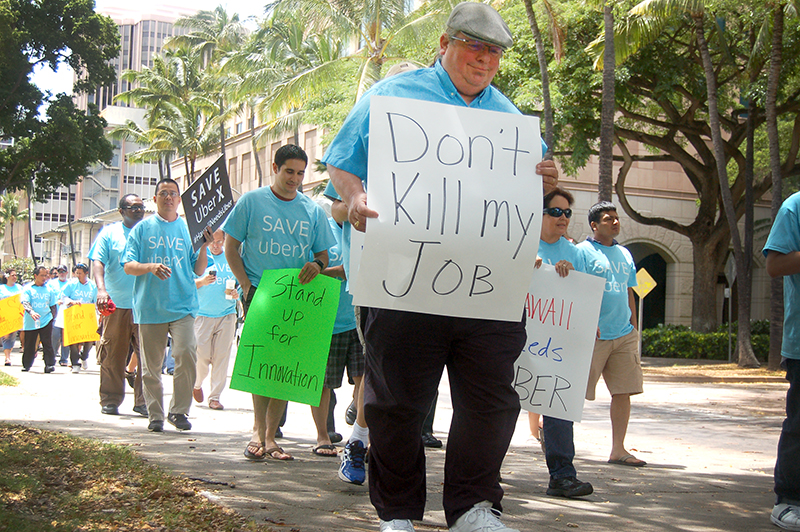
For their part, traditional taxi companies have come out with their own statements condemning Uber’s attempts to kill the bill. Here’s what Dale Evans, President & CEO of Charley’s Taxi & Limousine said:
There are almost 2,000 licensed taxi drivers in Honolulu who are operating safe, legal and fair commercial transportation services.
Many of these drivers are independent contractors who are paying all of the proper licenses and fees required by Hawaii State law. In addition, they all possess the correct commercial insurance and are filing their general excise taxes.
By State law and City & County ordinances, if you are providing transportation services for pay in Honolulu, you are required to have either a Taxi License or a PUC license.
[Last week’s] rally was simply a push for Uber drivers to operate both without the proper licenses and without paying all of the appropriate taxes and fees.
I believe that SB1280 SD2 HD2 is a step in the right direction to making “transportation network companies” adhere to the laws put in place to ensure the safety of community members using commercial transportation services.
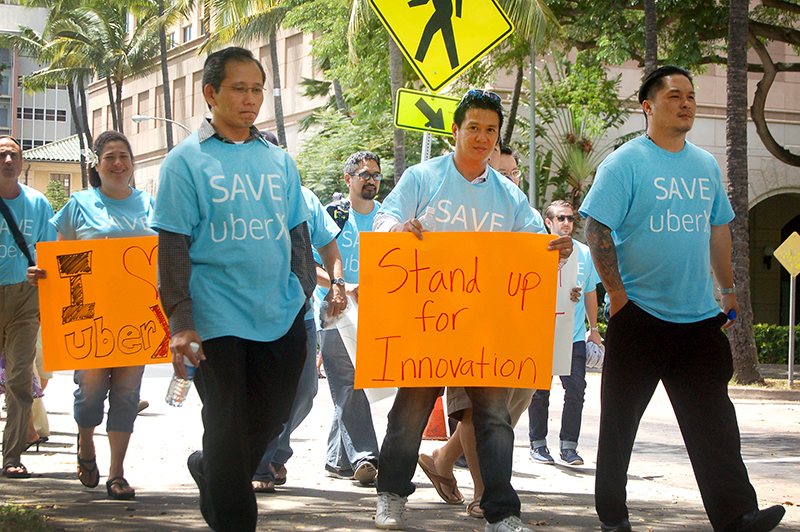
Taking into account Uber’s success at positioning itself as the cool way to get around town—designed to appeal to a sizable demographic of tech-savvy, unmarried, upwardly-mobile, young professionals—it’s not surprising that this online campaign has been successful at drumming up opposition to the bill. Many of my own friends, whom I deeply respect, have jumped on the #HawaiiNeedsUber wagon, taking Uber’s statements at face-value.
“Hawaii friends! Please sign this petition to keep Uber on the island!” wrote my friend Aly Pluta on Facebook in a March 13 post I was tagged in. “It only takes few seconds and they are already more than halfway to the goal of 2,000 signatures!”
After I stated that I thought it perfectly reasonable to regulate TNCs like Uber, she repeated the line that Uber had been feeding social media users, and which Hughes would later use at the rally: “Uber wouldn’t be able to operate at all in Hawaii. The regulations don’t just limit their business, it would eliminate it,” she stated. “Personally I use Uber on an almost weekly basis, (instead of driving under the influence, taking the bus, paying a sketchy taxi in cash) and it would definitely impact my involvement in Honolulu’s nightlife and events.”
“HEY MR. SENATOR. We love @uber_hawaii! Why are you trying to stop one of the best things to ever happen to this island?” wrote Marlene Kieu on March 6. “DO NOT SUPPORT SB 1280!”
“Yes! Rally for #RideSharing at the capitol to save @uber_hawaii!” wrote Derick Gabriel on April 2.
Nightlife establishments including BAMP Project’s The Safehouse have also made statements of support for Uber online. Even State Representative Kaniela Ing, a millennial himself, has come out against the bill:
“The future of ride-sharing in Hawaii rests on today’s vote,” he wrote April 2. “Uber and Lyft are not typical multinational corporations. Rather, they are digital ecosystems that have already empowered hundreds of Hawaii residents to launch their own businesses.”
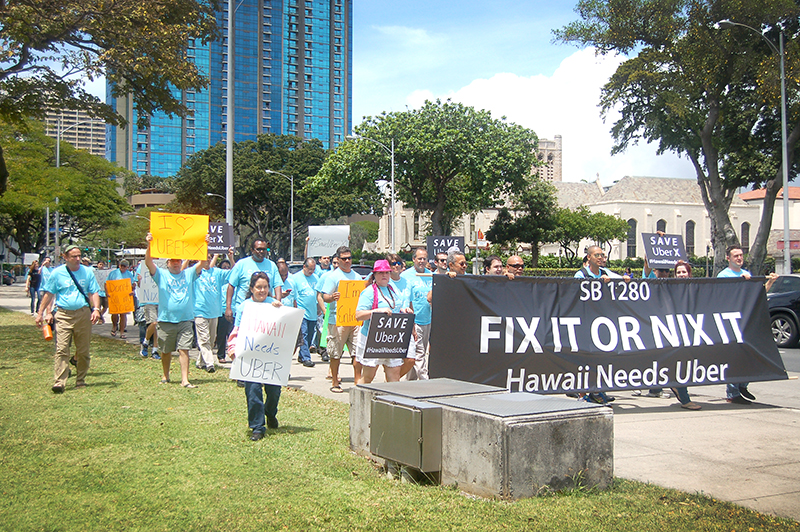
But what is Uber’s argument against being regulated? First of all, it’s important to note that SB1280 targets TNC-based services. The larger company, Uber, provides three products: uberX, the TNC service; Uber Black, a limo service; and Uber Taxi, which is a traditional, metered taxi service. However, the TNC-based service is the only service Uber provides here in Hawaii.
Uber Hawaii is claiming that TNC companies are inherently different from traditional taxi services, because they are mobile-app-based “ride-sharing” services, an assertion this is almost universally accepted by the media and the TNC core-demographic. Therefore, Uber claims, it should not be regulated the same way local taxi companies are.
“There’s a lot left to be desired in the transportation infrastructure of the state, and we believe in forward-thinking legislation that welcomes people sharing rides together, splitting fares together and, generally, going carless,” said Hughes. “We do a lot, not only for the economy, but also for the general satisfaction of our customers here in the State of Hawaii.”
“Right now, these TNCs have a competitive advantage over the existing companies that do comply with all the safety regulations, including full insurance,” said David Jung, general manager of EcoCab. “TNCs like Uber and Lyft are multi-billion dollar companies. This fight between taxi companies and TNCs essentially boils down to corporate greed. They want less regulation so they can continue to increase their profits. But the problem with that is that it’s at the risk of negatively impacting public safety.”
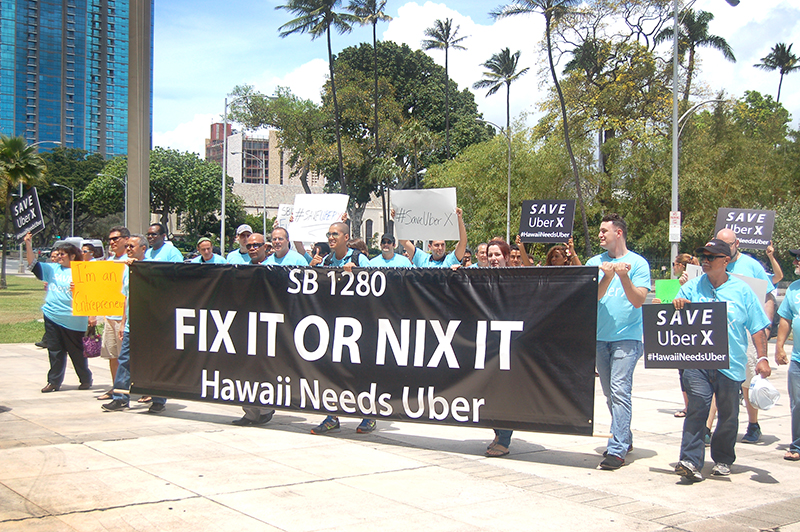
Part of what makes Uber and other TNC companies so appealing to its demographic is the innovation of using a mobile app to structure and drive the business. Even Jung admits that particular innovation was a stroke of start-up style genius, and gives TNCs a legitimate edge.
But Uber is a $17 billion multinational company. When added to other companies like Lyft, the TNC industry clocks in at $40 billion. These are not small start-ups; they are large venture-backed corporations, and they don’t need the illegitimate edge that skirting around regulations yields.
I’ve used Uber before on several occasions, as well as Lyft, and—other than the use of a mobile-app to summon the driver—there’s no difference between a TNC service and a regular taxi service.
By contrast, here is an example of actual ride-sharing: I’m driving to Kahala Mall and my roommate needs a ride to the University of Hawaii at Manoa; in order to take one car off the road and lessen our carbon-footprint for the day, I drop him off on my way to the mall and then pick him up again on the way home. We have just shared a ride.
But when you summon an Uber or Lyft driver, they drive to pick you up and then drive you to where ever you tell them to go. App-based or not, that is the definition of a taxi service.
“They are nothing like a true ride-sharing company,” said Jung. “The sharing economy is a wonderful, beautiful thing that’s expanded thanks to technology—don’t screw that up by claiming to be a part of it when you’re sharing nothing. It offends me that a multi-billion dollar company, with it’s multi-million dollar campaign, is somehow usurping that idea and damaging true grass-roots movements that have been built by responsible companies.”
So when Uber tells us that Hawaii needs them because they help reduce carbon-footprints, they are, at the very least, being disingenuous.
“I am probably the only red meat-eating, hard-smoking, scotch-drinking tree hugger there is; I have invested a lot of money into helping the environment through our hybrid EcoCabs, which are more costly; I myself do not own a vehicle—I use public transportation,” said Jung. “So it actually offends me that Uber and Lyft are trying to steal that ‘ride-share’ concept. That concept holds so much potential for efficiency and environmental protection, and they’ve taken it and, quite frankly, abused it.”
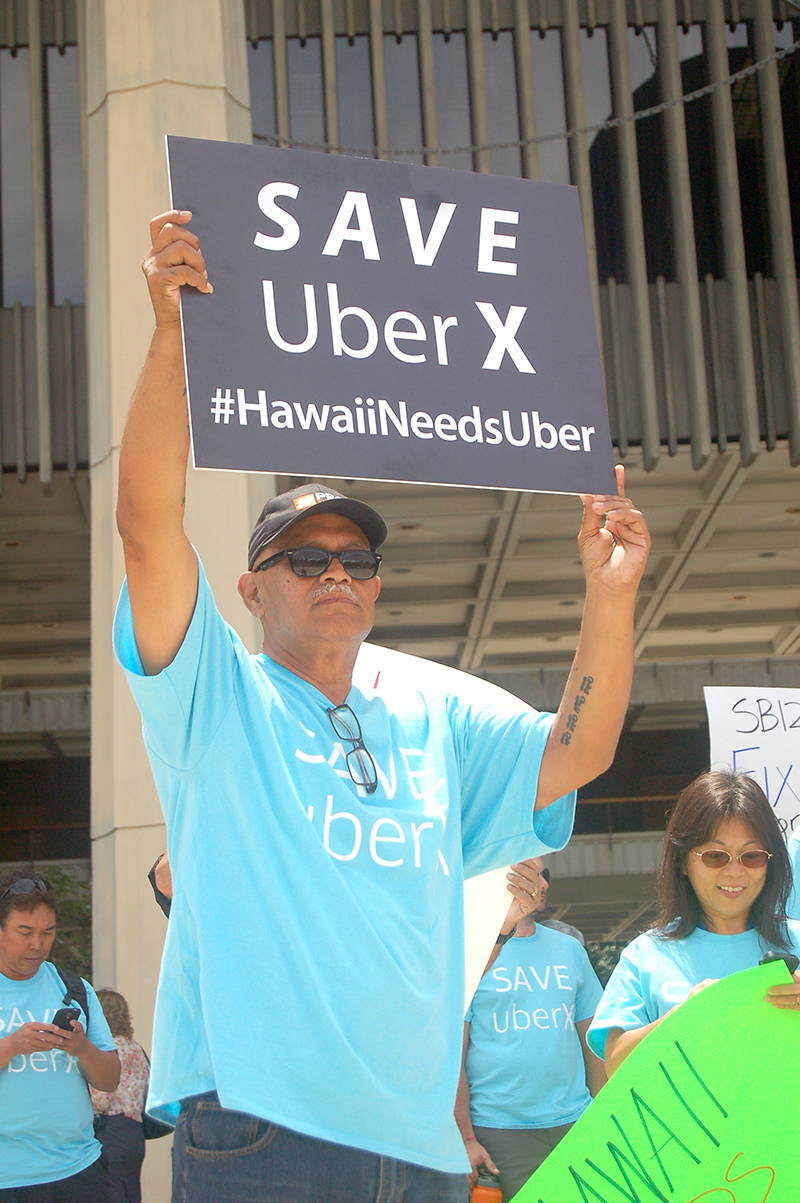
Uber also claims that there is no need for the government regulation proposed in SB1280 (and, yes, they use regulation like its a dirty word) because they already have “robust” insurance policies in place.
“This bill ignores an insurance compromise made at the national level made between Uber and every major insurance industry trade association, so it’s basically leaving Hawaii behind as the rest of the mainland moves forward,” Hughes claimed. “Many other cities, many other states have signed on and said this is a sufficient way to protect people in our state. Basically the whole section on insurance in this bill needs to be revamped.”
According to Hughes, Uber Hawaii’s current insurance policies are already 2.5–5 times the commercial liability minimums required by the state.
“These are pretty robust insurance packages,” said Hughes. “This bill would say, ‘that’s not enough.’”
Their claim is that increasing the level of insurance protection with which they are required to operate would prevent the TNC corporations from serving the people of Hawaii by costing them so much money that it would force them to cease operations. Again, this is a $17 billion company, and these levels are the exact same the government requires local companies like Charlie’s and EcoCab to have.
“If their policies are so robust, then it shouldn’t be too much of a difference to step up to the level of protection that the state is asking them for—which is identical to what we comply with at EcoCab,” said Jung. “If they have a truly robust insurance policy already in place, then complying with the state should cost them next to nothing.”
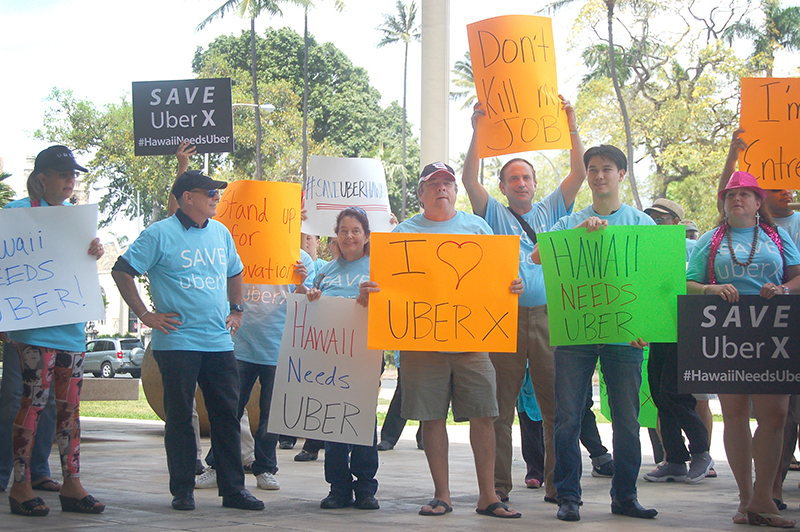
So which is it? Either Uber does have robust insurance already, in which case their claim that SB1280 would force a shut down of operations stands on seriously shaky ground; or Uber doesn’t have robust insurance, in which case SB1280 might be costly for them, but incredibly necessary as well. Here’s the best answer we could get:
“Uber is a company that is willing to shut down its operations if the right thing is not done for the constituents,” said Hughes. “We very much do not want it to come to that, but a bill like this would force it.”
“There’s nothing in the bill that would force them to shut down,” countered Jung. “In fact, the bill doesn’t do enough to protect the consumer or to level the playing field. It doesn’t require the full, comprehensive insurance that we’re under, and it allows them to continue using surge pricing.”
One of the biggest knocks on Uber and other TNCs is their use of “surge pricing,” which they affectionately call “dynamic pricing.” This means that, at night, when cabs are in high demand and hundreds of millennials with disposable income are trying to get home from the bars, Uber drivers can actually increase their fare rates by up to 3–400 percent, effectively gouging their customers, who may or may not be too inebriated to notice (especially since their in-app payment system charges your credit cards without ever having to look at how much you owe).
“They can undersell us when it’s slow, and then they can charge whatever they want once the demand exceeds the supply—that’s how they make their money back,” said Jung.
The current regulations on taxi companies prohibit this sort of price gouging during high-volume periods of time. Taxis are required, by state law, to maintain a fixed rate. Sure, during low-demand periods, Uber and Lyft might be slightly cheaper, which attracts people to their business. But, when you really need them, don’t expect to get out of the car having spent any less than with a regular cab.
“Why don’t they want to submit their metering and make it available to the state to ensure that it’s being handled fairly? Everyone else does it,” said Jung. “Are we just supposed to trust you? ‘Trust us, we’ve got insurance; trust us, our meters are accurate; trust us, we won’t surge price more than 200 percent’—no one else has to rely on the public simply trusting them.”
And that’s not the only area in which TNCs are able to cut corners at the customer’s expense under current state law.
“The bill actually doesn’t go nearly far enough to address true safety concerns either,” said Jung. “Taxi drivers are required to go through physical exams so we don’t have a heart attack or a stroke while we’re driving—they should too! I mean, come on, are you only hiring triathletes? Of course not! Everyone else has to do it, so please, just do it too.”
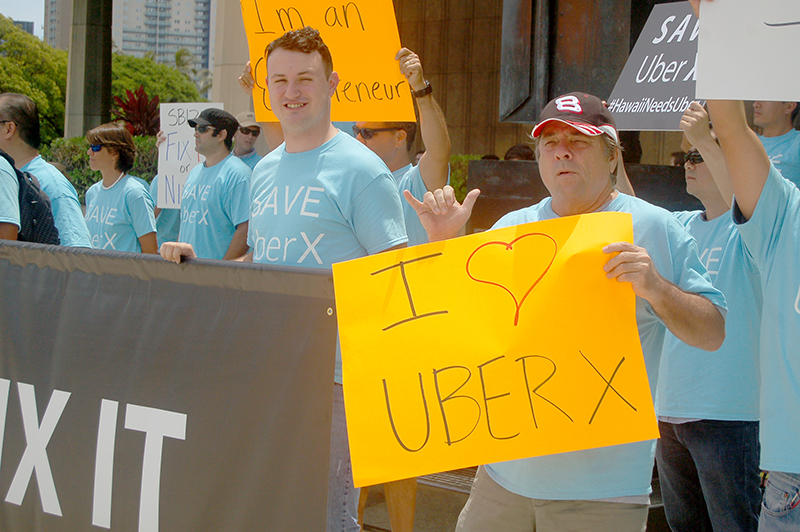
Uber has a history of entering a market and ignoring whatever regulations are in place. Understandably, companies that do play by the rules have had significant problems with this. Uber has met sharp resistance from taxi companies in cities like London and Portland; in South Korea, Uber CEO Travis Kalanick was indicted in December for violating local transportation laws; and in Broward County, Florida, Uber is actively encouraging its drivers in to ignore county regulations
“In cases like Broward County, it is irresponsible to tell your independent contractor drivers—they’re treated like pawns—to tell them, ‘go break the law; we’ll pay for your fines,’” said Jung.
And this last point—that the Uber drivers themselves are actually being put at risk by being asked to break the law, by not having required health exams and by not having proper insurance, is truly disheartening when you look into the faces of the Uber drivers who came out to support their employer at last week’s rally. Decked out in matching sky-blue shirts, they genuinely believed that this bill could kill their jobs and that Uber is somehow protecting them by opposing it.
Of course, we haven’t even begun to talk about the rape and assault allegations facing unregulated Uber drivers around the country, and I don’t think we really have to. After all, Uber Hawaii has not exhibited those same problems. But therein lies the point: regulation is not inherently a bad thing. It can save people’s lives. In fact, deregulation of companies has led to a briar patch of problems for the environment and for people in this country and all over the world.
Regulations like the ones in SB1280 are meant to protect the public consumer from price gouging, from unqualified or potentially unfit drivers and from unscreened drivers who may have violent criminal pasts. And they’re also meant to protect the drivers themselves.
“They are not the grass-roots, environmental friendly, socially progressive company they allow people to think they are,” said Jung. “They don’t claim to be that—they don’t embarrass themselves quite that much. But they certainly hint at it and have no problem allowing people to assume that about them. It’s time for them to play by the same rules as everyone else.”
All photos by Will Caron
